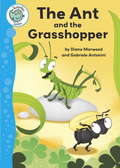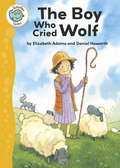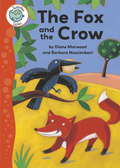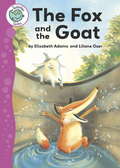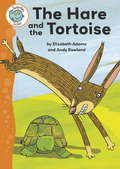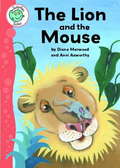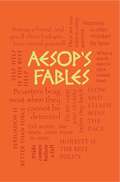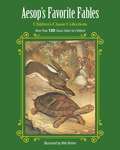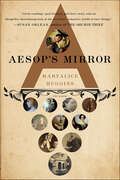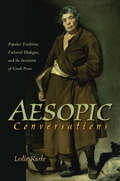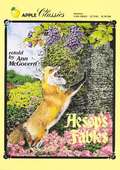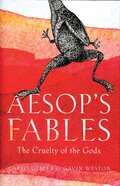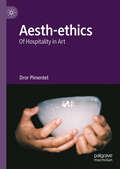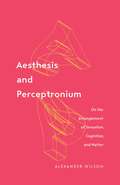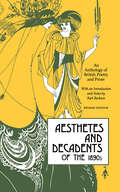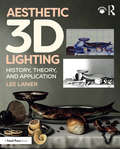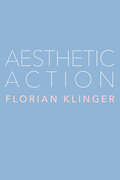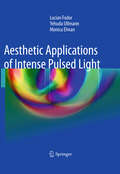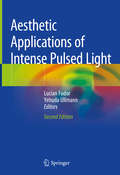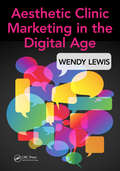- Table View
- List View
Aesop's Fables: The Ant and the Grasshopper (Tadpoles Tales #13)
by Diane MarwoodA simple retelling of a favourite Aesop fable. Grasshopper thinks Ant should stop working so hard and just enjoy the hot summer. But what will happen when the cold winter comes?
Aesop's Fables: The Boy Who Cried Wolf (Tadpoles Tales #14)
by Elizabeth AdamsA simple retelling of a favourite Aesop fable. Whenever the shepherd boy gets bored, he shouts, 'Wolf!' and everybody runs to help. But, one day, a real wolf comes ...
Aesop's Fables: The Fox and the Crow (Tadpoles Tales #15)
by Diane MarwoodA simple retelling of a favourite Aesop fable. Crow has some food, and Fox wants it! Can he think of a clever plan to make Crow drop the food?
Aesop's Fables: The Fox and the Crow (Tadpoles Tales)
by Diane Marwood Barbara NascimbeniA simple retelling of a favourite Aesop fable. Crow has some food, and Fox wants it! Can he think of a clever plan to make Crow drop the food?
Aesop's Fables: The Fox and the Goat (Tadpoles Tales #16)
by Elizabeth AdamsA simple retelling of a favourite Aesop fable. Fox is trapped in a well and he tricks Goat into joining him. But can he trick Goat again to get out?
Aesop's Fables: The Hare and the Tortoise (Tadpoles Tales #17)
by Elizabeth AdamsA simple retelling of a favourite Aesop fable. Hare thinks he is much quicker than Tortoise and never stops teasing her. But what will happen when they have a race?
Aesop's Fables: The Hare and the Tortoise (Tadpoles Tales)
by Elizabeth Adams Andy RowlandA simple retelling of a favourite Aesop fable. Hare thinks he is much quicker than Tortoise and never stops teasing her. But what will happen when they have a race?
Aesop's Fables: The Lion and the Mouse (Tadpoles Tales #18)
by Diane MarwoodA simple retelling of a favourite Aesop fable. Mouse is in big trouble when he wakes Lion up... but one day, Lion might need Mouse's help!
Aesop's Fables: Together With The Life Of Aesop - Primary Source Edition (Wordsworth Classics)
by AesopAesop was a slave and storyteller who lived in ancient Greece around 620-564 BC. No writings by him exist (if they ever existed at all), yet numerous stories and tales have been credited to him and have been shared through oral tradition throughout the world. Many of these use animals as the main characters to convey deeper meanings and morals that have become ingrained in our cultural--and personal--belief systems. For example, in "The Goatherd and the Goat" we learn that there is no use trying to hide what can't be hidden. In "The Ass and the Purchaser" we find that people are known by the company they keep. In "The Boys and the Frogs," one person's pleasure may be another person's pain. "The Dogs and the Fox" show how easy it is to kick a man when he's down. And misery loves company, as we see in "The Fox Without a Tail."
Aesop's Favorite Fables: More Than 130 Classic Fables for Children!
by Milo WinterRacehorse Publishing’s Children’s Classic Collections is a new series that offers readers timeless compilations of children’s literature. Handsomely packaged and affordable, this new series aims to revitalize these enchanting works and continue the tradition of sharing them with the next generation.Passed down for thousands of years, Aesop’s Fables is a collection of moral stories by the famed storyteller from ancient Greece. Reprinted and translated thousands of times over the past two millennia, this collection represents some of the most widely known and famous children’s literature. Many of these fables bestow human traits upon animal characters and place them in human situations to highlight desirable and less desirable traits. Their intent, through the telling of these tales, is to teach readers important moral lessons such as "Self-help is the best help” or "Do not attempt too much all at once.”Accompanied by beautiful color illustrations by renowned illustrator Milo Winter, this premiere collection of Aesop’s Favorite Fables is sure to ignite young imaginations and educate readers about virtue, kindness, integrity, problem-solving, happiness, and what it means to be human.
Aesop's Mirror
by Maryalice Huggins"Everything I needed to know about Fox and Grapes mirror, I knew the moment I first saw it"What antiques restorer Maryalice Huggins knew when she stumbled across the mirror at a country auction in Rhode Island was this: She was besotted. Rococo and huge (more than eight feet tall), the mirror was one of the most unusual objects she had ever seen. Huggins had to have it.The frame's elaborate carvings were almost identical to a famous eighteenth-century design. Could this be eighteenth-century American? That would make it rare indeed. But in the rarefied world of American antiques, an object is not significant unless you can prove where it's from. Huggins set out to trace the origins of her magnificent mirror.Fueled with the delightfully obsessive spirit of Susan Orlean's The Orchid Thief, Aesop's Mirror follows Huggins on her quest as she goes up against the leading lights of the very male world of high-end antiques and dives into the historical archives. And oh, what she finds there! The mirror was likely passed down through generations of the illustrious Brown family of Providence, Rhode Island.Throughout history, mirrors have been seen as having mystical powers, enabling those who peer into them to connect the past and the future. In Aesop's Mirror, Maryalice Huggins does just that, creating a marvelous, one-of-kind book about a marvelous, one of-a-kind American treasure.
Aesopic Conversations
by Leslie KurkeExamining the figure of Aesop and the traditions surrounding him, Aesopic Conversations offers a portrait of what Greek popular culture might have looked like in the ancient world. What has survived from the literary record of antiquity is almost entirely the product of an elite of birth, wealth, and education, limiting our access to a fuller range of voices from the ancient past. This book, however, explores the anonymous Life of Aesop and offers a different set of perspectives. Leslie Kurke argues that the traditions surrounding this strange text, when read with and against the works of Greek high culture, allow us to reconstruct an ongoing conversation of "great" and "little" traditions spanning centuries.Evidence going back to the fifth century BCE suggests that Aesop participated in the practices of nonphilosophical wisdom (sophia) while challenging it from below, and Kurke traces Aesop's double relation to this wisdom tradition. She also looks at the hidden influence of Aesop in early Greek mimetic or narrative prose writings, focusing particularly on the Socratic dialogues of Plato and the Histories of Herodotus. Challenging conventional accounts of the invention of Greek prose and recognizing the problematic sociopolitics of humble prose fable, Kurke provides a new approach to the beginnings of prose narrative and what would ultimately become the novel.Delving into Aesop, his adventures, and his crafting of fables, Aesopic Conversations shows how this low, noncanonical figure was--unexpectedly--central to the construction of ancient Greek literature.
Aesop’s Fables
by Ann Mcgovern A. J. McclaskeySixty-seven familiar and not so familiar fables from Aesop, including the tortoise and the hare, the frogs who wanted a king, the lion who fell in love, and the donkey who danced on the roof.
Aesop’s Fables: The Cruelty of the Gods
by Carlo Gébler&“A welcome feast of fables for our times … Carlo Gébler&’s book is a wonderful, gloomy and welcome addition to the Aesopic corpus … The stories have been re-written in a spiky, contemporary style … The content of these pessimistic stories is thought-provoking but what makes the collection absolutely delightful is the vigor and originality of Carlo Gébler&’s writing. The illustrations by Gavin Weston are likewise magnificent.&” —The Irish Times &“This repackaging of [Aesop's] fables by Carlo Gebler and illsutrator Gavin Weston is a reminder that adult minds were originally the target of this litany of pocket-sized parables ... There is very much a feeling here of the ancient sound-tracking the alarmingly present.&” —Sunday Independent (Dublin) &“Scary new versions of ancient morality tales, Aesop's Fables, with stings in all their tails [...] are full of adult wisdom, human misfortune and bitter experiences, which, because they happen to other people, are hilarious.&” —Belfast TelegraphTHE GREATEST COLLECTION OF FABLES EVER WRITTEN, UPDATED FOR OUR TURBULENT TIMES A witty illustrated version of the world's greatest collection of fables, allegedly written by a slave in the 5th century BC. A book for our times: as Gebler notes, Aesop has two subjects—the exercise of power and the experience of the powerless who endure life and all that it inflicts on them. This retelling of the Fables makes them relevant and richly enjoyable. Large and fierce animals kill and butcher weaker creatures; gods play games with the hopes and fears of lesser species, including men and women; and occasionally the weak turn the tables on the strong, exposing their pretensions. This is a stunning new version of a book that was often bowdlerized and used to teach moral lessons to children. Gebler&’s Aesop is darker and more realistic, and compulsively readable.
Aesth-ethics: Of Hospitality in Art
by Dror PimentelThe question of hospitality is the most pressing question in contemporary thought: How can we host that which is utterly Other, that which resists all conceptualization, and thus disrupts the proper course of thought? In the current book, the discussion of hospitality is given a new conceptualization, and extended to the field of aesthetics: the event of hospitality does not occur in the face-to-face encounter with the other person, as Emmanual Levinas conceived of it, but rather in the encounter with the work of art itself. Writing about the event of hospitality—as it is eventuated in art—involves subverting the traditional precedence of theory over practice. This subversion is also evident in the indifference to traditional distinctions, such as those between poetry and visual art; modern art and classical art; international art and local art. Moreover, most of the artworks considered throughout are hybrid in character: they are suspended in the space between the visual and the verbal, whether they involve the verbal representation of a visual object (as in Rilke’s poem “Archaic Torso of Apollo”), or a visual representation of a verbal object (as in Anselm Kiefer’s work “Your Golden Hair Margarete”). The consideration of these and other works come together to give rise to a novel and original discourse on art that is termed “Aesth-ethics,” and which is presented for the first time in this volume.
Aesthesis and Perceptronium: On the Entanglement of Sensation, Cognition, and Matter (Posthumanities #51)
by Alexander WilsonA new speculative ontology of aesthetics In Aesthesis and Perceptronium, Alexander Wilson presents a theory of materialist and posthumanist aesthetics founded on an original speculative ontology that addresses the interconnections of experience, cognition, organism, and matter. Entering the active fields of contemporary thought known as the new materialisms and realisms, Wilson argues for a rigorous redefining of the criteria that allow us to discriminate between those materials and objects where aesthesis (perception, cognition) takes place and those where it doesn&’t. Aesthesis and Perceptronium negotiates between indiscriminately pluralist views that attribute mentation to all things and eliminative views that deny the existence of mentation even in humans. By recasting aesthetic questions within the framework of &“epistemaesthetics,&” which considers cognition and aesthetics as belonging to a single category that can neither be fully disentangled nor fully reduced to either of its terms, Wilson forges a theory of nonhuman experience that avoids this untenable dilemma. Through a novel consideration of the evolutionary origins of cognition and its extension in technological developments, the investigation culminates in a rigorous reevaluation of the status of matter, information, computation, causality, and time in terms of their logical and causal engagement with the activities of human and nonhuman agents.
Aesthetes and Decadents of the 1890s: An Anthology of British Poetry and Prose
by Karl BecksonThe Aesthetic and Decadent Movement of the late 19th century spawned the idea of "Art for Art's Sake," challenged aesthetic standards and shocked the bourgeosie. From Walter Pater's study, "The Renaissance to Salome, the truly decadent collaboration between Oscar Wilde and Aubrey Beardsley, Karl Beckson has chosen a full spectrum of works that chronicle the British artistic achievement of the 1890s. In this revised edition of a classic anthology, "The Ballad of Reading Gaol" has been included in its entirety; the bibliography has been completely updated; Professor Beckson's notes and commentary have been expanded from the first edition published in 1966. The so-called Decadent or Aesthetic period remains one of the most interesting in the history of the arts. The poetry and prose of such writers as Yeats, Wilde, Symons, Johnson, Dowson, Barlas, Pater and others are included in this collection, along with sixteen of Aubrey Beardsley's drawings.
Aesthetic 3D Lighting: History, Theory, and Application
by Lee LanierAesthetic 3D Lighting: History, Theory, and Application delves into the history, the theory, and the practical and aesthetic application of lighting in the fine arts and 3D animation. In this book, animation industry veteran and lighting expert Lee Lanier examines the importance of lighting and its ability to communicate information to the viewer. Lee examines the history of lighting as applied to the fine arts, film, photography, and 3D animation. He discusses the use of light color, light location and direction, and light shadow types to recreate specific locations and to generate moods. He includes guides for successful lighting in 3D animation. Software-agnostic examples lead you through useful 3D lighting set-ups. Chapter-long case studies step you through more complex 3D lighting projects in Autodesk Maya. An accompanying eResource (www.routledge.com/9781138737570) features 3D model files, scene files, and texture bitmaps, allowing you to practice the discussed techniques in Autodesk Maya and many other 3D programs. The lighting techniques covered in this book include: History of lighting as used in the fine arts The scientific mechanisms of light Light types and light application in 3D programs Light qualities including shadows variations Basic and advanced 3D lighting approaches 1-, 2-, 3-point, naturalistic, and stylistic lighting techniques Replication of real-world lighting scenarios and locations Overview of advanced 3D lighting and rendering systems
Aesthetic Action
by Florian KlingerIn this new book, Florian Klinger gives readers a basic action-theoretical account of the aesthetic. While normal action fulfills a determinate concept, Klinger argues, aesthetic action performs an indeterminacy by suspending the action's conceptual resolution. Taking as examples work by Tino Sehgal, Kara Walker, Mazen Kerbaj, Marina Abramović, Cy Twombly, and Franz Kafka, the book examines indeterminacy in such instances as a walk that is at once leisurely and purposeful, a sound piece that is at once joyous and mournful and mechanical, or a sculpture that at once draws one in and shuts one out. Because it has irresolution as its point, aesthetic action presents itself as an unsettling of ourselves, our ways, our very sense of who we are. As performers of such action, we don't recognize one another as bearers of a shared human form as we normally would, but find ourselves tasked anew with figuring out what sharing a form would mean. In conversation with philosophers such as Kant, Hegel, Wittgenstein, and Anscombe; political thinkers such as Marx and Lorde; and contemporary interlocutors such as Michael Thompson, Sebastian Rödl, and Thomas Khurana, Klinger's book makes a case for a conception of the human form that systematically includes the aesthetic: an actualization of the form that is indeterminate and nevertheless rational. The book gives the project of Western philosophical aesthetics a long-overdue formulation for our present that aims to do justice to contemporary aesthetic production as it actually exists. It will appeal to those working in philosophy, art, and political thought.
Aesthetic Animism: Digital Poetry's Ontological Implications
by David Jhave JohnstonA poetics appropriate to the digital era that connects digital poetry to traditional poetry's concerns with being.This book offers a decoder for some of the new forms of poetry enabled by digital technology. Examining many of the strange technological vectors converging on language, it proposes a poetics appropriate to the digital era while connecting digital poetry to traditional poetry's concerns with being (a.k.a. ontological implications). Digital poetry, in this context, is not simply a descendent of the book. Digital poems are not necessarily “poems” or written by “poets”; they are found in ads, conceptual art, interactive displays, performative projects, games, or apps. Poetic tools include algorithms, browsers, social media, and data. Code blossoms into poetic objects and poetic proto-organisms.Introducing the terms TAVs (Textual-Audio-Visuals) and TAVITS (Textual-Audio-Visual-Interactive), Aesthetic Animism theorizes a relation between scientific method and literary analysis; considers the temporal implications of animation software; and links software studies to creative writing. Above all it introduces many examples of digital poetry within a playful yet considered flexible taxonomy. In the future imagined here, digital poets program, sculpt, and nourish immense immersive interfaces of semi-autonomous word ecosystems. Poetry, enhanced by code and animated by sensors, reengages themes active at the origin of poetry: animism, agency, consciousness. Digital poetry will be perceived as living, because it is living.
Aesthetic Applications of Intense Pulsed Light
by Yehuda Ullmann Monica Elman Lucian FodorThe book is structured into eight chapters: 1. Skin anatomy. This chapter is intended to describe the pertinent anatomy related to IPL applications. In addition to the described main structural elements of the skin, the chapter has important points about skin aging and histological aspects which gives the reader a better understanding of the etiology of skin lesions and the need for Intense Pulsed Light (IPL) treatment. 2. Light-tissue interaction. This chapter describes the interaction between IPL and different skin structures. Target skin structures (chromophores) are described in detail. The results of this interaction are detailed as being important to understanding the goals and principles of IPL treatment. 3. IPL safety and legal issues. This chapter describes the needs of the environment for a safe treatment. The necessary equipment and things to avoid pitfalls which may lead to lawsuits are detailed. Several aspects of IPL legal issues are also described: how to avoid medical liabilities and how to manage them are also included in this chapter. 4. Patient selection. This chapter describes the pearls and pitfalls in selecting patients for IPL treatment. This is not an easy task and proper patient selection is extremely important to have satisfied patients. Problematic patient types are also described here. 5. Skin rejuvenation. This chapter starts with a description of skin aging. Intrinsic and extrinsic mechanisms are detailed. The most common skin lesions related to aging that can benefit from IPL treatment for rejuvenation are detailed. The chapter continues with treatment protocols which describe strategies for achieving optimal results. A review of the literature is included, presenting the treatment parameters of different studies and their results. 6. Hair removal. This chapter starts with a description of the hair follicle cycle, hair types and important structures for treatment. Treatment strategies are emphasized and detailed, starting from choosing the right parameters to post-treatment recommendations. A literature review is presented regarding treatment parameters and results according to different authors. 7. Vascular lesions treatment. This chapter describes the types of vascular lesions that can benefit from IPL treatment. The treatment protocol is emphasized and all the steps for performing this application are described in detail. A literature review is presented and different results are compared regarding treatment parameters. 8. Complications. It is inevitable that any medical treatment can end with complications. The possible complications of the most common IPL applications (skin rejuvenation, hair removal, pigmented and vascular lesion treatment) are detailed. The way to avoid them and how to handle them is also described. At the end of each chapter, there is a section on the practical points highlighting the most important points of the chapter. An extensive literature review of this technology is presented alongside numerous illustrations, tables and color pictures. The book will benefit any doctor or healthcare professional who uses IPL for cosmetic purposes, such as plastic surgeons, dermatologists, ophthalmologists, maxillofacial surgeons and otolaryngologists dealing with aesthetics of the face, as well as residents interested in learning the subject.
Aesthetic Applications of Intense Pulsed Light
by Yehuda Ullmann Lucian FodorThis significantly revised second edition provides a practical guide to applications of Intense Pulsed Light (IPL) in aesthetic and non-aesthetic field. It features revised chapters focusing on skin anatomy, light tissue interactions and legal issues associated with IPL safety. New topics covered include the use of IPL for rosacea, pigmented lesions, scars and stria distensae. Key points are emphasized through the inclusion of learning objectives at the beginning and review questions at the end of each chapter. Aesthetic Applications of Intense Pulsed Light systematically describes the aesthetic applications of IPL in practice and includes extensive didactic material to assist the trainee looking to develop their knowledge of IPL applications and the experienced practitioner looking for an up-to-date resource on the subject.
Aesthetic Breast Augmentation Revision Surgery: From Problem to Solution
by Roy De VitaThis book deals with the management of difficult breast augmentation revision cases. After critically reviewing the complication rate in aesthetic breast augmentation, the authors go on to discuss the importance of the inframammary fold. Moreover, this book provides detailed instructions on how to manage capsular contracture; wrinkling; animation deformity; implant rotation and waterfall deformities; symmastia; implant rupture; infection and implant exposure; double bubble; and bottoming out. Each chapter starts with a short explanation of the complication, followed by step-by-step revision procedures. Checklists, high-quality images, flowcharts and bullet point-like presentations will help surgeons solve these various problems. Well-structured chapters and a concise format make this book a quick reference guide that aids clinicians in making decisions and providing treatment.
Aesthetic Clinic Marketing in the Digital Age
by Wendy LewisSocial media provides a new way for aesthetic practitioners to connect with consumers and to differentiate their clinics. However, to most clinic managers and practitioners, digital media represents a sea of confusion that they cannot even begin to know how to navigate. With over 20 years of experience in medical aesthetics, Lewis offers a unique understanding of the challenges clinics face every day to market their products and services ethically, manage patients and stay profitable. This text serves as an expert user's guide written specifically for healthcare professionals in need of an in-depth introduction and comprehensive actionable program for digital marketing, social media, and aesthetic clinic management. It is a must-read for practitioners.
Aesthetic Clinic Marketing in the Digital Age: From Meta to AI
by Wendy LewisAesthetic practitioners and medical spas have flourished, and global statistics indicate that consumer engagement is at an all-time high. The rise of social media provides new ways to connect with consumers and differentiate clinics that stand out in the marketplace. For busy clinic managers and practitioners, keeping up with the nuances of digital media trends is practically a full-time job. With over 25 years of experience in medical aesthetics, Wendy Lewis shares her deep understanding of the challenges aesthetic practitioners face to effectively market their products and services, manage patients, and increase profits. This updated text is the definitive expert user’s guide written specifically for healthcare professionals and medical spa managers to present best practices and actionable strategies for mastering digital marketing, social media, branding, and the advent of AI. It is a must-read for aesthetic practitioners to keep up with the latest developments they need to manage their businesses effectively in this highly competitive field.This second edition features: NEW chapters on hot topics you need to know MORE tips, charts, tables, and resources UP-TO-THE-MINUTE strategies for success
